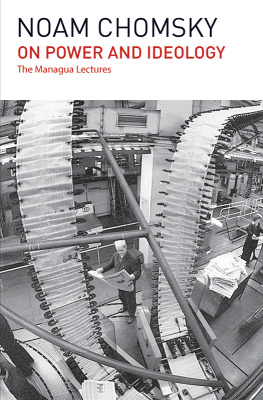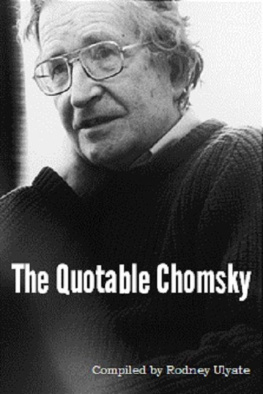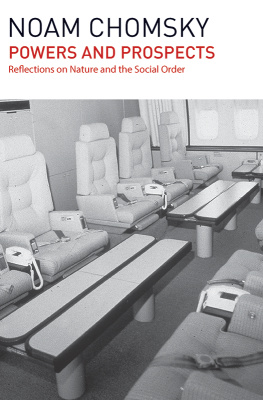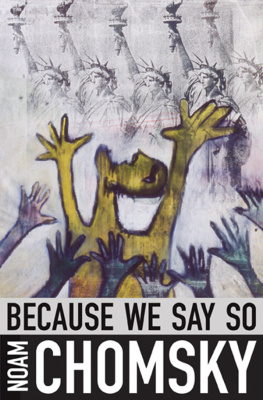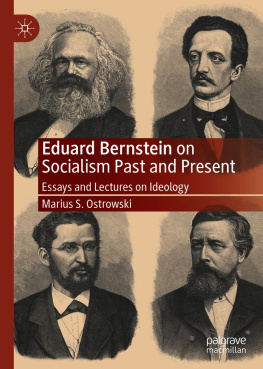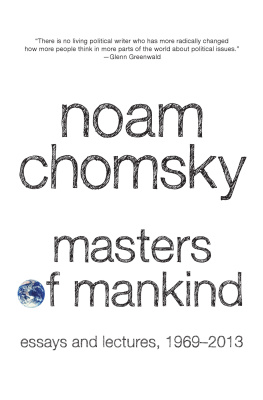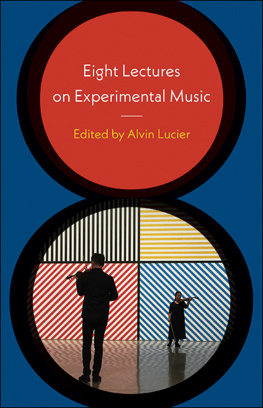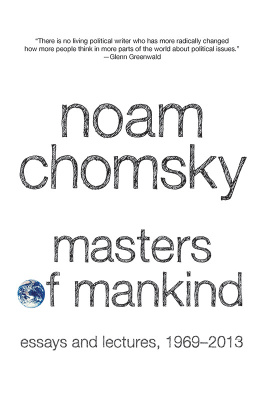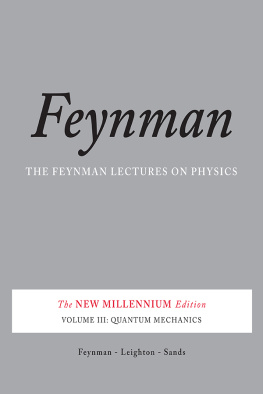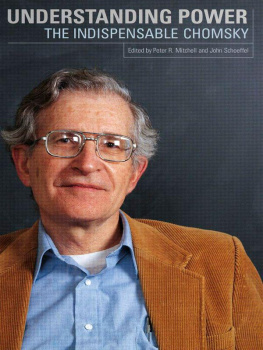Chomsky - On power and ideology : the Managua lectures
Here you can read online Chomsky - On power and ideology : the Managua lectures full text of the book (entire story) in english for free. Download pdf and epub, get meaning, cover and reviews about this ebook. City: Central America., Central America--United States., Array, United States--Central America, year: 2015, publisher: Haymarket Books;Pluto Press, genre: Politics. Description of the work, (preface) as well as reviews are available. Best literature library LitArk.com created for fans of good reading and offers a wide selection of genres:
Romance novel
Science fiction
Adventure
Detective
Science
History
Home and family
Prose
Art
Politics
Computer
Non-fiction
Religion
Business
Children
Humor
Choose a favorite category and find really read worthwhile books. Enjoy immersion in the world of imagination, feel the emotions of the characters or learn something new for yourself, make an fascinating discovery.
On power and ideology : the Managua lectures: summary, description and annotation
We offer to read an annotation, description, summary or preface (depends on what the author of the book "On power and ideology : the Managua lectures" wrote himself). If you haven't found the necessary information about the book — write in the comments, we will try to find it.
On power and ideology : the Managua lectures — read online for free the complete book (whole text) full work
Below is the text of the book, divided by pages. System saving the place of the last page read, allows you to conveniently read the book "On power and ideology : the Managua lectures" online for free, without having to search again every time where you left off. Put a bookmark, and you can go to the page where you finished reading at any time.
Font size:
Interval:
Bookmark:
Contents
Table of Contents
Preface to the 2015 Edition vii
Preface xvii
Lecture 1: The Overall Framework of Order 1
Lecture 2: Containing Internal Aggression 31
Lecture 3: Our Little Region Over Here 71
Lecture 4: National Security Policy 117
Lecture 5: The Domestic Scene 147
Bibliographical Notes 177
Preface
In the first week of March, 1986, I had the opportunity to visit Managua and to lecture at the Universidad Centroamericana (UCA), at the invitation of Rector Csar Jerez, S.J., and also under the auspices of the research center of CIDCA, directed by Galio Gurdin. These lectures consisted of a morning series devoted to problems of language and knowledge, and a late afternoon series devoted to contemporary political issues. Participants included a wide range of people from the academic community and many others in Nicaragua, as well as visitors from Costa Rican universities and foreigners visiting or working in Nicaragua. The lectures, which I delivered in English, were expertly translated into Spanish for the listening audience by Danilo Salamanca and Mara-Esther Zamora, who translated the public discussion as well. The proceedings were broadcast (and, I subsequently learned, picked up by short wave in the United States) and transcribed, including the discussions afterward, though inevitably many of the thoughtful and informative comments from the floor were not captured properly on the tape recorder and hence do not appear here.
The chapters that follow consist of somewhat extended versions of the afternoon lectures on contemporary political issues and an edited version of the transcripts of the discussion. The morning lectures and discussion will appear in a separate volume, to be published by MIT Press in Cambridge, with the title Language and Problems of Knowledge. In attempting to reconstruct the discussion from the transcript, I added material that was missing from the tape in a few places and I have sometimes transferred the discussion from one place to another where it fits more naturally with the edited lectures. Particularly in the transcripts of the afternoon discussion, I have also eliminated a considerable amount of material that I was able to incorporate into the text of the lectures, essentially in response to queries and interventions by the audience. These interventions appear only in fragmentary form below, in part because of this editing, in part because of the technical difficulty of recording speakers from the large and diffuse audience in a bilingual discussion, which proceeded with remarkable facility thanks to the translators and good will of the participants. The published transcripts therefore give only a very limited indication of the stimulating nature of the comments and questions during the lively and open discussion periods, which were all too short because of the constraints of time.
I would like to express particular thanks to Danilo Salamanca and Mara-Esther Zamora, not only for the careful way in which they carried out the difficult and trying task of translation in both directions, but also for their assistance to me in preparing the lectures. I was particularly pleased that Claribel Alegra agreed to undertake the translation of both volumes into Spanishboth my English text and the discussion transcriptsfor the Nicaraguan edition. The English version that appears here, prepared for publication a few months later, includes supplementary documentation and further editing, along with some bibliographical notes at the end.
I would also like to express my thankshere speaking as well for my wife, Carol, who accompanied me on this visitto Csar Jerez, Galio Gurdin, Danilo Salamanca and Mara-Esther Zamora, Claribel Alegra, and the many others who spent so much time and effort in making our visit a most memorable occasion for us. We much appreciate the gracious hospitality and care of the many friends, from many walks of life, whom we met in Managua, and the opportunity for very informative discussions with them, and even for some travel and informal visits at their homes, interspersed in a demanding but exhilarating schedule of meetings and lectures. I would also like to thank many people whose names I do not know or remember: the sisters of the Asuncin order who welcomed us in the agricultural cooperative they organized in an impoverished peasant community near Len, the participants in the public meetings and other discussions, and many others. I might mention particularly the opportunity to meet many people from the wonderful community of exiles from the U.S.-installed horror chambers in the region, who have fled to a place where they can be free from state terror and can live with some dignity and hopethough the Master of the Hemisphere is doing what it can to prevent this grave threat to order and stability.
I expected that Nicaragua would be very different from the picture that filters through the U.S. media, but I was pleased to discover how large the discrepancy is, an experience shared with many other visitors, including people who have lived for extended periods in many parts of the country. It is quite impossible for any honest visitor from the United States to speak about this matter without pain and deep regret, without shame over our inability to bring other U.S. citizens to comprehend the meaning and the truth of Simn Bolivars statement, over 150 years ago, that the United States seems destined to plague and torment the continent in the name of freedom; and over our inability to bring an end to the torture of Nicaragua, and not Nicaragua alone, which our country has taken as its historical vocation for over a century, and pursues with renewed dedication today.
Noam Chomsky
On Power and Ideology: The Manague Lectures
1987 by Noam Chomsky
Original edition published by South End Press in Boston, Massachusetts.
This edition published in 2015 by
Haymarket Books
P.O. Box 180165
Chicago, IL 60618
773-583-7884
www.haymarketbooks.org
info@haymarketbooks.org
ISBN: 978-1-60846-441-8
Trade distribution:
In the US, Consortium Book Sales and Distribution, www.cbsd.com
All other countries, Publishers Group Worldwide, www.pgw.com
This book was published with the generous support of Lannan Foundation and Wallace Action Fund.
Cover design by Josh On. Cover photo of Pravda s printing presses in 1982 by Vladimir Rodionov.
Library of Congress Cataloging-in-Publication Data is available.
Lecture 3
Our Little Region Over Here
Your primary interest of course is Central America today. I have been discussing a broader range of topics before turning to this one. My purpose has been to make it clear that what the United States is doing in Central America is simply one typical expression of very general and longstanding features of its foreign policy. These features are easy to understand in terms of the structure of power within the United States. They are explained in the secret record of high-level planning and even much public discourse if one knows how to extract the real content from its rhetorical disguise. More significantly, these features are clearly revealed in the historical record, as the U.S. political leadership has proceeded to follow the advice of the doves, putting aside vague and idealistic slogans such as human rights, the raising of the living standards, and democratization, and turning to harsh measures when necessary to achieve its immediate national objectives, primary among them, to secure the Fifth Freedom.
In my opinion, one can gain an adequate understanding of what is happening right here in Central America only by approaching and thinking about the matter in this more general context. It is important to be clear about this, and not to fall into the error of supposing that current developments reflect some dramatically new departure in U.S. policy formation, some blunder or deviation that will be overcome by the choice of a new leadership within the political spectrum, which is, in reality, quite narrow. At the same time, I do not want to underestimate the differences that may exist within this spectrum. They are in fact rather limited, but in the case of a state with enormous power and resources of violence, slight changes may translate into very meaningful differences for the people at the wrong end of the guns.
Next pageFont size:
Interval:
Bookmark:
Similar books «On power and ideology : the Managua lectures»
Look at similar books to On power and ideology : the Managua lectures. We have selected literature similar in name and meaning in the hope of providing readers with more options to find new, interesting, not yet read works.
Discussion, reviews of the book On power and ideology : the Managua lectures and just readers' own opinions. Leave your comments, write what you think about the work, its meaning or the main characters. Specify what exactly you liked and what you didn't like, and why you think so.

